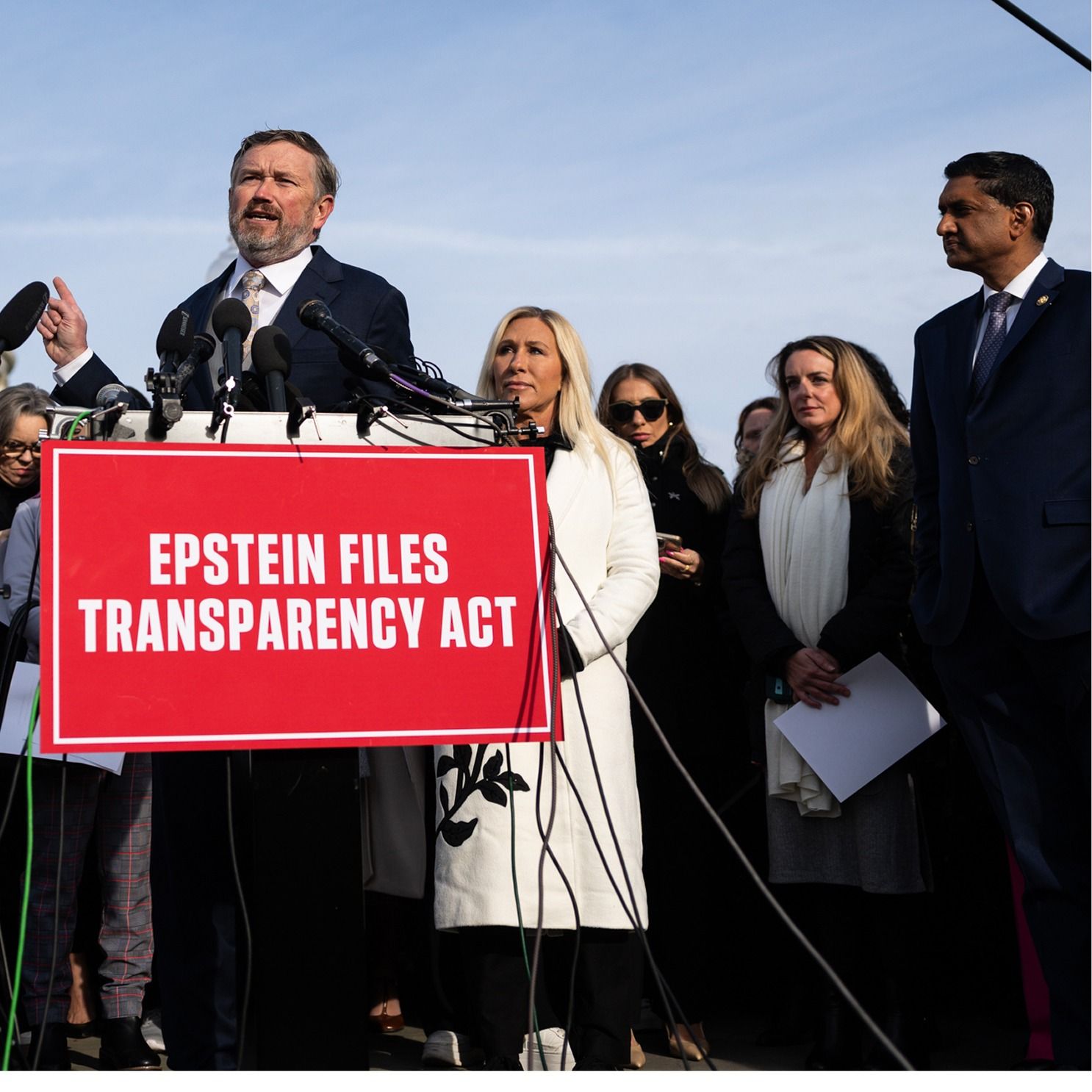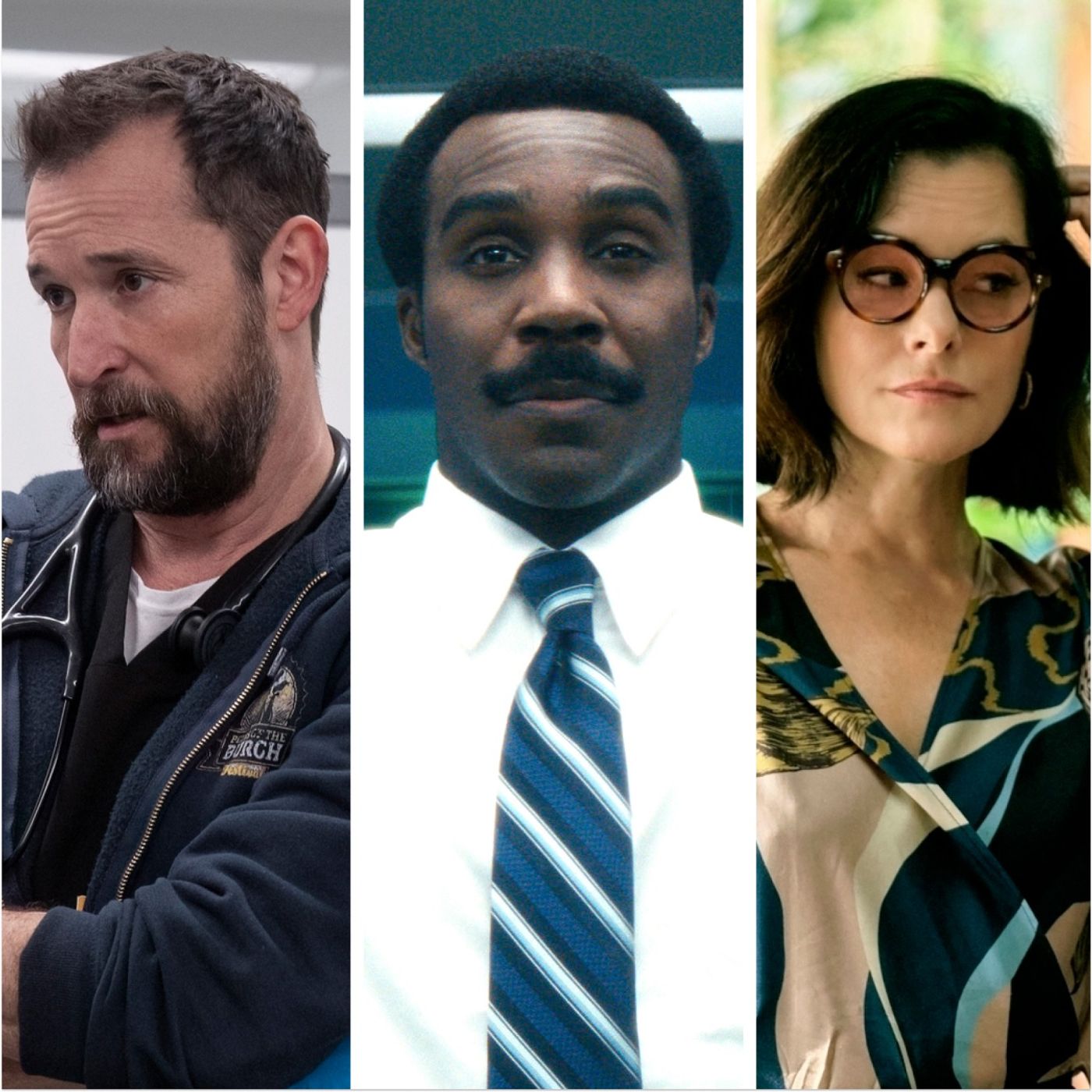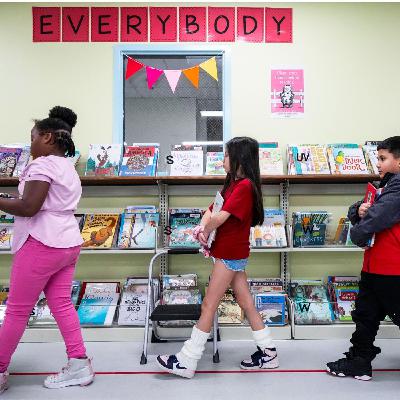Discover The Daily
The Daily

The Daily
Author: The New York Times
Subscribed: 1,929,313Played: 114,141,238Subscribe
Share
© 2020-2021 THE NEW YORK TIMES COMPANY; The New York Times encourages the use of RSS feeds for personal use in a news reader or as part of a non-commercial blog, subject to your agreement to our Terms of Service.
Description
This is what the news should sound like. The biggest stories of our time, told by the best journalists in the world. Hosted by Michael Barbaro, Rachel Abrams and Natalie Kitroeff. Twenty minutes a day, five days a week, ready by 6 a.m.
Subscribe today at nytimes.com/podcasts or on Apple Podcasts and Spotify. You can also subscribe via your favorite podcast app here https://www.nytimes.com/activate-access/audio?source=podcatcher.
Subscribe today at nytimes.com/podcasts or on Apple Podcasts and Spotify. You can also subscribe via your favorite podcast app here https://www.nytimes.com/activate-access/audio?source=podcatcher.
1378 Episodes
Reverse
Since starting his second term, President Trump has thrown the full weight of the federal government behind the denying the idea of transgender identity, and pushing to prevent trans minors from getting gender-affirming medical care.Two parents of a trans child discuss facing the scramble of supporting their child, and their fears of becoming targets of the government.Guest: The parents of Allie, who is trans.Background reading: Hospitals are limiting gender treatment for trans minors, even in blue states.States have sued over Mr. Trump’s efforts to end pediatric transgender medical care.Trans youth are rattled by efforts to ban gender care. So are hospitals.Photo: Christopher Capozziello for The New York TimesFor more information on today’s episode, visit nytimes.com/thedaily. Transcripts of each episode will be made available by the next workday.
Subscribe today at nytimes.com/podcasts or on Apple Podcasts and Spotify. You can also subscribe via your favorite podcast app here https://www.nytimes.com/activate-access/audio?source=podcatcher. For more podcasts and narrated articles, download The New York Times app at nytimes.com/app.
After years of soaring optimism and colossal investment, Wall Street has begun to seriously question whether the frenzy for A.I. is justified.Cade Metz, who covers technology for The New York Times, explains why Silicon Valley companies believe so fervently in A.I. and why they’re willing to take enormous risks to deliver on its promise.Guest: Cade Metz, a technology reporter for The New York Times.Background reading: Why debt funding is ratcheting up the risks of the A.I. boom.Amazon, Google, Meta, Microsoft and OpenAI plan to spend at least $325 billion by the end of the year in pursuit of A.I.Photo: Scott Ball for The New York TimesFor more information on today’s episode, visit nytimes.com/thedaily. Transcripts of each episode will be made available by the next workday.
Subscribe today at nytimes.com/podcasts or on Apple Podcasts and Spotify. You can also subscribe via your favorite podcast app here https://www.nytimes.com/activate-access/audio?source=podcatcher. For more podcasts and narrated articles, download The New York Times app at nytimes.com/app.
Congressional Republicans on Tuesday overwhelmingly approved a bill to release all of the files related to the sex offender Jeffrey Epstein — a bill that President Trump spent months trying to kill.The Times correspondents Anni Karni and Carl Hulse explain how a rebellion started by a handful of Republican lawmakers became a partywide mutiny, and Representative Thomas Massie talks about his role in bringing about the vote.Guest:Annie Karni, a congressional correspondent at The New York Times.Carl Hulse, the chief Washington correspondent for The Times.Representative Thomas Massie, Republican of Kentucky.Background reading: The vote to approve was a stunning turn for an effort that Republican leaders had worked for months to block.For Mr. Trump, the Epstein scandal is the story that won’t go away.Photo: Tierney L. Cross/The New York TimesFor more information on today’s episode, visit nytimes.com/thedaily. Transcripts of each episode will be made available by the next workday.
Subscribe today at nytimes.com/podcasts or on Apple Podcasts and Spotify. You can also subscribe via your favorite podcast app here https://www.nytimes.com/activate-access/audio?source=podcatcher. For more podcasts and narrated articles, download The New York Times app at nytimes.com/app.
There was once a time when documentaries could be found only on public television or in art-house cinemas. But today, documentaries are more popular and accessible than ever, with streaming services serving up true crime, celebrity documentaries, music documentaries and so much more.On today’s Sunday Special, Gilbert is joined by The New York Times’s chief television critic, James Poniewozik, and Alissa Wilkinson, a Times film critic, to talk about the documentaries that are worth your viewing time. On Today’s Episode:James Poniewozik is the chief TV critic for The Times.Alissa Wilkinson is a movie critic at The Times, and writes the Documentary Lens column. Background Reading:What ‘The American Revolution’ Says About Our Cultural Battles‘Come See Me in the Good Light’: The Sweetness After a Terminal Diagnosis Discussed on this episode:“The American Revolution,” 2025, directed by Ken Burns, Sarah Botstein and David Schmidt“The Alabama Solution,” 2025, directed by Andrew Jarecki and Charlotte Kaufman“The Jinx: The Life and Deaths of Robert Durst,” 2015, directed by Andrew Jarecki“Making a Murderer,” 2015, directed by Laura Ricciardi and Moira Demos“The Yogurt Shop Murders,” 2025, directed by Margaret Brown“The Perfect Neighbor,” 2025, directed by Beet Gandbhir“The Last Dance,” 2020, directed by Jason Hehir“Copa 71,” 2023, directed by Rachel Ramsay and James Erkine“Cheer,” 2020, created by Greg Whiteley“Last Chance U,” 2016, directed by Greg Whiteley, Adam Ridley and Luke Lorentzen“Pee-wee as Himself,” 2025, directed by Matt Wolf“The Remarkable Life of Ibelin,” 2024, directed by Benjamin Ree“Ladies & Gentlemen … 50 Years of SNL Music,” 2025, directed by Questlove“Cameraperson,” 2016, directed by Kirsten Johnson“An American Family,” 1973, created by Craig Gilbert“Look Into My Eyes,” 2024, directed by Lana Wilson“When We Were Kings,” 1996, directed by Leon Gast Photo: Mike Doyle/American Revolution Film Project and Florentine Films
Subscribe today at nytimes.com/podcasts or on Apple Podcasts and Spotify. You can also subscribe via your favorite podcast app here https://www.nytimes.com/activate-access/audio?source=podcatcher. For more podcasts and narrated articles, download The New York Times app at nytimes.com/app.
This year has been a banner year for video games, with an abundance of surprise releases and unexpected hits.On this week’s Sunday Special, Gilbert Cruz talks with two fellow gamers — Zachary Small, a culture reporter, and Jason Bailey, an editor on The Times’s culture desk — about the state of the industry, the biggest releases and the games they loved playing in 2025. They also share their predictions for Game of the Year.On Today’s EpisodeZachary Small is a culture reporter for The Times.Jason M. Bailey is an editor on the culture desk, and oversees The Times’s video game coverage.
Subscribe today at nytimes.com/podcasts or on Apple Podcasts and Spotify. You can also subscribe via your favorite podcast app here https://www.nytimes.com/activate-access/audio?source=podcatcher. For more podcasts and narrated articles, download The New York Times app at nytimes.com/app.
The only thing Gilbert Cruz loves more than celebrating Halloween is watching scary movies. And between the classic horror franchises that span decades and the prestige original films of the current moment, he has seen hundreds of them. On today’s episode, Gilbert puts his knowledge to use in conversation with his fellow horror aficionados Jason Zinoman and Erik Piepenburg. They comb through a century of spooks, frights and screams to crown the Top 10 franchises in cinema history. Horror franchises discussed on this episode:“A Nightmare on Elm Street”“A Quiet Place”“Alien”“The Amityville Horror”“Candyman”“Child’s Play”“The Conjuring”“The Exorcist”“The Evil Dead”“Final Destination”“Friday the 13th”“Halloween”The Hannibal Lecter films“Hellraiser”“The Hills Have Eyes”“Insidious”“Jaws”“Night of the Living Dead”“The Omen”“Paranormal Activity”“Phantasm”“Poltergeist”“Psycho”“The Purge”“The Ring”“Saw”“Scream”“Terrifier”“The Texas Chainsaw Massacre”The Universal monster films“V/H/S” On Today’s Episode:Jason Zinoman is a critic at large for The Times and the author of “Shock Value: How a Few Eccentric Outsiders Gave Us Nightmares, Conquered Hollywood, and Invented Modern Horror.”Erik Piepenburg covers culture for The Times, and writes a monthly column about horror movies.Additional Reading:25 Jump Scares That Still Make Us JumpFive Horror Movies to Stream Now‘Good Boy’ Review: Sit. Stay. Scream. Photo: Michael Ochs Archives/Getty Images
Subscribe today at nytimes.com/podcasts or on Apple Podcasts and Spotify. You can also subscribe via your favorite podcast app here https://www.nytimes.com/activate-access/audio?source=podcatcher. For more podcasts and narrated articles, download The New York Times app at nytimes.com/app.
On Friday, “Springsteen: Deliver Me From Nowhere” will be released in theaters. Rather than chronicling Bruce’s entire life, the film focuses on the making of his stripped-down 1982 album “Nebraska” and on his concurrent mental health struggles.This movie is the latest in a long history of musician biopics featuring stars like Bob Dylan, Loretta Lynn, Eminem and Elvis Presley. Hollywood clearly loves telling the stories of influential artists.In this episode, Gilbert Cruz chats with Lindsay Zoladz, a pop music critic for The Times, and Joe Coscarelli, a Times culture reporter, about the tropes of the genre and their favorite films that break the mold.On Today’s Episode:Lindsay Zoladz, a pop music critic at The Times and the writer of The Amplifier newsletter.Joe Coscarelli, a culture reporter at The Times and co-host of “Popcast.”Additional Reading:The Boss Finally Gets a Biopic, Just Not the One We ExpectedHe’s Ringo. And Nobody Else Is.Why Music Movies Stink: ‘Back to Black’ + ‘The Idea of You’ ReactionsJoe Coscarelli’s “Bobby + Joanie” playlistPhoto: 20th Century Studios
Subscribe today at nytimes.com/podcasts or on Apple Podcasts and Spotify. You can also subscribe via your favorite podcast app here https://www.nytimes.com/activate-access/audio?source=podcatcher. For more podcasts and narrated articles, download The New York Times app at nytimes.com/app.
Broadway represents some of the best and most exciting of what American theater has to offer. But for many people, it’s inaccessible. Whether because of geography, cost or other considerations, most people will never sit in a Broadway theater and experience a play or a musical in person.For years, cast recordings have offered a way to experience Broadway shows at a remove. And now, in the streaming era, some Broadway shows are making themselves available to be watched remotely, in movie theaters and on television. Distance and expense aren’t the impediments they once were to culture lovers looking to experience world-class theater.In this episode, Gilbert Cruz talks with Jesse Green and Elisabeth Vincentelli, two of The New York Times’s culture writers, about new ways to experience some of the joys of theater from the comfort of your own home. On Today’s Episode:Jesse Green is a Culture correspondent, focusing primarily on the fine arts, including theater, classical music and art.Elisabeth Vincentelli writes about culture for The Times. Background Reading:Want to Listen to Musical Cast Albums? Our Top 10 Desert Island PicksTheater to Stream: Mark Rylance in ‘Twelfth Night,’ and MoreTimes Theater Fans on Their Favorite Musical Cast Albums Photo Illustration by The New York Times; Inset: Disney+
Subscribe today at nytimes.com/podcasts or on Apple Podcasts and Spotify. You can also subscribe via your favorite podcast app here https://www.nytimes.com/activate-access/audio?source=podcatcher. For more podcasts and narrated articles, download The New York Times app at nytimes.com/app.
Amusement parks are enduring vacation destinations for American families. The rides, the long lines for rides, the concessions, the long lines for concessions — these are practically familial rites of passage. Theme parks are also enormous moneymakers, with industry leaders such as Disney and Universal earning billions of dollars each year from their parks.In this episode, Gilbert Cruz chats with Brooks Barnes, who writes about show business (including theme parks), and Mekado Murphy, a film editor and thrill-seeker who reports on roller coasters. They talk about the state of the contemporary amusement park and the ups and downs of roller coasters around the world.On Today’s Episode:Mekado Murphy is the assistant film editor for The New York Times, and its unofficial roller coaster correspondent.Brooks Barnes covers Hollywood for The New York Times.Background Reading:Riding Your Way Through Epic UniverseSee the Real Live Man Who Grew Up in a CarnivalPhoto: Business Wire/Associated Press
Subscribe today at nytimes.com/podcasts or on Apple Podcasts and Spotify. You can also subscribe via your favorite podcast app here https://www.nytimes.com/activate-access/audio?source=podcatcher. For more podcasts and narrated articles, download The New York Times app at nytimes.com/app.
This month kicked off the big four fashion weeks: New York, London, Milan and Paris. Each year, designers, brands, influencers and celebrities flock to these events to see and be seen.On today’s episode, Gilbert sits down with Stella Bugbee and Jacob Gallagher, two of The Times’s foremost style experts and veterans of the fashion week circuit, to discuss clothes. They talk about what fashion week means in the frenetic fashion ecosystem of 2025, and they answer some listener questions about how to cultivate a personal style. On Today’s Episode:Stella Bugbee, the Styles editor for The New York Times.Jacob Gallagher, a fashion reporter for The New York Times.Background Reading:Armani’s Influence on New York Fashion WeekPhoto: Simbarashe Cha
Subscribe today at nytimes.com/podcasts or on Apple Podcasts and Spotify. You can also subscribe via your favorite podcast app here https://www.nytimes.com/activate-access/audio?source=podcatcher. For more podcasts and narrated articles, download The New York Times app at nytimes.com/app.
This month, The Times released a list of the 50 best restaurants in America. The Food desk’s reporters, critics and editors crisscrossed the country from Portland, Ore., to Deer Isle, Maine, to scout places formal and casual, big and small, experimental and classic. Their survey is an evocation of what it’s like to dine out, right now, in America.On today’s episode, Gilbert sits down with the Food reporters Priya Krishna and Brett Anderson, two contributors to the list, for a veritable feast of dining wisdom. They discuss what makes a restaurant worthy of the 50 best list, how they go about finding those restaurants, and the dining trends they’re loving and hating in 2025.On Today’s Episode:Priya Krishna, reporter and video host for New York Times Food and CookingBrett Anderson, reporter for New York Times Food and CookingBackground Reading:America’s Best Restaurants 2025Photo: Chase Castor for The New York Times
Subscribe today at nytimes.com/podcasts or on Apple Podcasts and Spotify. You can also subscribe via your favorite podcast app here https://www.nytimes.com/activate-access/audio?source=podcatcher. For more podcasts and narrated articles, download The New York Times app at nytimes.com/app.
The 77th Primetime Emmy Awards ceremony is tonight, honoring the best television shows released between June 2024 and May 2025. But before the festivities begin, Gilbert Cruz, the editor of The New York Times Book Review, would like to have a TV celebration of his own.On today’s episode, he gathers Jason Zinoman, a critic at large for The Times, and Alexis Soloski, a culture reporter for The Times, to “channel surf” through some of their favorite shows of the past year.On Today’s Episode:Jason Zinoman, a critic at large for The New York Times who writes a column about comedy.Alexis Soloski, a culture reporter for The New York Times. Additional Reading:The 9 People Who Check In to Every ‘White Lotus’Sympathy for the Devil, er Boss: In ‘The Studio,’ the Powerful Are on Defense
Subscribe today at nytimes.com/podcasts or on Apple Podcasts and Spotify. You can also subscribe via your favorite podcast app here https://www.nytimes.com/activate-access/audio?source=podcatcher. For more podcasts and narrated articles, download The New York Times app at nytimes.com/app.
As kids across America head back to school, Gilbert Cruz, the editor of The New York Times Book Review, is thinking about the books he read when he was in school.On today’s Sunday Special, Gilbert talks with the Book Review editor Sadie Stein and the author Louis Sachar (“Wayside School” series, “Holes”) about the books they read when they were students, and ways to encourage young readers today to keep reading.Additional reading10 Books for Kids Starting Preschool12 Books for Kids Starting Kindergarten15 Books for Kids Starting Middle SchoolFor a future Sunday Special, ask us your personal style questions.Photo: Brett Coomer / Houston Chronicle, via Getty Images
Subscribe today at nytimes.com/podcasts or on Apple Podcasts and Spotify. You can also subscribe via your favorite podcast app here https://www.nytimes.com/activate-access/audio?source=podcatcher. For more podcasts and narrated articles, download The New York Times app at nytimes.com/app.
Welcome to the Sunday Special, running now through the end of the year. Every Sunday, Gilbert Cruz, the editor of The New York Times Book Review, will talk with a rotating cast of Times critics and culture and lifestyle reporters about “the fun stuff”— pop culture, movies, TV, music, fashion and more.On today’s inaugural episode, Gilbert sits down with Jon Caramanica, a pop music critic at The Times, and Madison Malone Kircher, an internet reporter at The Times, to recap their cultural highs and lows of this summer.Photo: Stephane Mahe / Reuters
Subscribe today at nytimes.com/podcasts or on Apple Podcasts and Spotify. You can also subscribe via your favorite podcast app here https://www.nytimes.com/activate-access/audio?source=podcatcher. For more podcasts and narrated articles, download The New York Times app at nytimes.com/app.
Rachel Abrams and Natalie Kitroeff officially join Michael Barbaro as co-hosts of the show. Welcome to the next chapter.
Subscribe today at nytimes.com/podcasts or on Apple Podcasts and Spotify. You can also subscribe via your favorite podcast app here https://www.nytimes.com/activate-access/audio?source=podcatcher. For more podcasts and narrated articles, download The New York Times app at nytimes.com/app.
When Taffy Brodesser-Akner became a writer, Mr. Lindenblatt, the father of one of her oldest friends, began asking to tell his story of survival during the Holocaust in one of the magazines or newspapers she wrote for. He took pride in telling his story, in making sure he fulfilled what he felt was the obligation of all Holocaust survivors, which was to remind the world what had happened to the Jews.His daughter Ilana knew it was a long shot but felt obligated to pass on the request — it was her father, after all. Taffy declined because after a life hearing about the Holocaust, she said, she was “all Holocausted out.”But, years later, when she learned of Mr. Lindenblatt’s imminent passing, Taffy asked herself what would become of stories like his if the generation of hers that was supposed to inherit them had taken the privilege that came with another generation’s survival and decided not to listen?So here it is, an old Jewish story about the Holocaust and a man who somehow survived the pernicious, organized and intentional genocide of the Jews. But right behind it, just two generations later, is another story, one about the children and grandchildren who have been so malformed by the stories that are their lineage that some of them made just as eager work of running from it, only to find themselves, same as anything you run from, having to deal with it anyway.
Subscribe today at nytimes.com/podcasts or on Apple Podcasts and Spotify. You can also subscribe via your favorite podcast app here https://www.nytimes.com/activate-access/audio?source=podcatcher. For more podcasts and narrated articles, download The New York Times app at nytimes.com/app.
Sometime in the 1850s or ’60s, at a terrible moment in U.S. history, a strange man seemed to sprout, out of nowhere, into the rocky landscape between New York City and Hartford, Conn. The word “strange” hardly captures his strangeness. He was rough and hairy, and he wandered around on back roads, sleeping in caves. Above all, he refused to explain himself. As one newspaper put it: “He is a mystery, and a very greasy and ill-odored one.” Other papers referred to him as “the animal” or (just throwing up their hands) “this uncouth and unkempt ‘What is it?’”But the strangest thing about the stranger was his suit.
Subscribe today at nytimes.com/podcasts or on Apple Podcasts and Spotify. You can also subscribe via your favorite podcast app here https://www.nytimes.com/activate-access/audio?source=podcatcher. For more podcasts and narrated articles, download The New York Times app at nytimes.com/app.
Today, millions of Americans will have the opportunity to see a rare total solar eclipse.Fred Espenak, a retired astrophysicist known as Mr. Eclipse, was so blown away by an eclipse he saw as a teenager that he dedicated his life to traveling the world and seeing as many as he could.Mr. Espenak discusses the eclipses that have punctuated and defined the most important moments in his life, and explains why these celestial phenomena are such a wonder to experience.Guest: Fred Espenak, a.k.a. “Mr. Eclipse,” a former NASA astrophysicist and lifelong eclipse chaser.Background reading: A total solar eclipse is coming. Here’s what you need to know.Millions of people making plans to be in the path of the solar eclipse on Monday know it will be awe-inspiring. What is that feeling?The eclipse that ended a war and shook the gods forever.For more information on today’s episode, visit nytimes.com/thedaily. Transcripts of each episode will be made available by the next workday.
Subscribe today at nytimes.com/podcasts or on Apple Podcasts and Spotify. You can also subscribe via your favorite podcast app here https://www.nytimes.com/activate-access/audio?source=podcatcher. For more podcasts and narrated articles, download The New York Times app at nytimes.com/app.
Jeanna Smialek, who covers the U.S. economy for The Times, will be 33 in a few weeks; she is part of a cohort born in 1990 and 1991 that makes up the peak of America’s population.At every life stage, that microgeneration has stretched a system that was often too small to accommodate it, leaving its members — so-called peak millennials — with outsize economic power but also a fight to get ahead.Guest: Jeanna Smialek, a U.S. economy correspondent for The New York Times.Background reading: When millennials gripe that they get blamed for everything, the accusers might actually be onto something.Millennials have the children, but boomers have the houses.For more information on today’s episode, visit nytimes.com/thedaily. Transcripts of each episode will be made available by the next workday.
Subscribe today at nytimes.com/podcasts or on Apple Podcasts and Spotify. You can also subscribe via your favorite podcast app here https://www.nytimes.com/activate-access/audio?source=podcatcher. For more podcasts and narrated articles, download The New York Times app at nytimes.com/app.
Fifty years ago, eight Americans set off for South America to climb Aconcagua, one of the world’s mightiest mountains. Things quickly went wrong. Two climbers died. Their bodies were left behind.Here is what was certain: A woman from Denver, maybe the most accomplished climber in the group, had last been seen alive on the glacier. A man from Texas, part of the recent Apollo missions to the moon, lay frozen nearby.There were contradictory statements from survivors and a hasty departure. There was a judge who demanded an investigation into possible foul play. There were three years of summit-scratching searches to find and retrieve the bodies.Now, decades later, a camera belonging to one of the deceased climbers has emerged from a receding glacier near the summit and one of mountaineering’s most enduring mysteries has been given air and light.This story was recorded by Audm. To hear more audio stories from publications like The New York Times, download Audm for iPhone or Android.
Subscribe today at nytimes.com/podcasts or on Apple Podcasts and Spotify. You can also subscribe via your favorite podcast app here https://www.nytimes.com/activate-access/audio?source=podcatcher. For more podcasts and narrated articles, download The New York Times app at nytimes.com/app.

























will A.I. robots be paying taxes to the government to make up for all the out of work people who would be paying taxes? 🤔 or maybe I don't understand what A.I is.
what uncreative and unimaginative journalism
Even their sides and beverages complement the main dishes perfectly. The fries are golden and crisp, while the Frosty adds the perfect sweet finish. Whether visiting for a quick lunch or a full meal, Wendy’s ensures that each bite is memorable. For more details on the menu and specials, you can check out their official site using this anchor: Wendy’s Menu.
Such interesting paradoxes discussed here.
🎦
If you’re looking for a smooth streaming experience, choosing the right IPTV provider is important. Not all services offer stable links, HD quality, or reliable support. That’s why many users in the UK are switching to trusted IPTV UK services that deliver high-quality IPTV channels without constant buffering. If you want great value and long-term stability, always go for the best IPTV option instead of cheap ones. And before you buy IPTV, make sure the provider offers a trial so you can test channel quality and performance. Buy Now :https://nexotts.com/
If you’ve ever upgraded your kitchen setup, you know the challenge, what do you do with your old yet perfectly working appliances? Whether it’s a Siemens oven, a Bosch dishwasher, or a Samsung refrigerator, letting it sit unused doesn’t make sense. Sell Used Appliances on https://sellusedappliances.ae and Buy Appliances on https://preownedhomeappliances.ae
Great info https://globesimsregistration.com.ph/
I liked the Montreal bagels better than the New York ones! They are softer and slightly sweeter. 😉😋
33:18 selfaware wolf 🐺
Gutfeld is not a serious person.
c'mon NYT. Don't normalize MAGA falsehoods.
That lawyer sounds like a dollar store RFK jr.
Okay, to everyone who said they would leave NYC if Mamdani won: - Where do you live? - Is your place rent stabilized?
who did west virginia vote for again?
I'm not a fan of celebrity but Jen is STILL awesome. She's always been real, and it's sad that she couldn't be her authentic self, because people are such dicks.
lots of softball questions
If you’re ready to invest in a Patek Philippe replica that combines luxury and affordability, visit Patek Philippe Replica today. Explore our collection and find the perfect watch for your next adventure! Discover how design and detail meet elegance at https://www.patekphilippereplica.io/
Discover how design and detail meet elegance at https://www.patekphilippereplica.io/
If you’re ready to invest in a Patek Philippe replica that combines luxury and affordability, visit Patek Philippe Replica today. Explore our collection and find the perfect watch for your next adventure! Discover how design and detail meet elegance at https://www.patekphilippereplica.io/